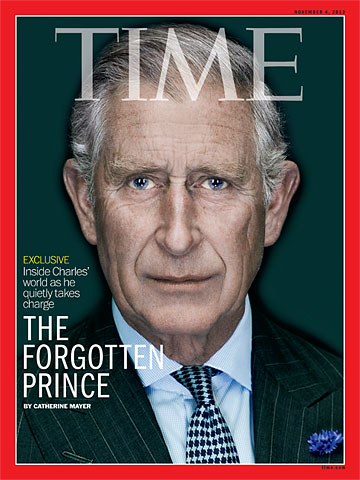
The gardens sport a coronet of dew under a rare Scottish sun, but Prince Charles remains indoors, doing what the heir to the thrones of the United Kingdom, Australia, Canada, Jamaica and 12 other Commonwealth realms has always done--his duty. He's a champion at enduring windy speeches, toes scrunched in his shoes to keep awake. But this particular duty lies closer to his soul: he's teaching his firstborn to wield a sword.
Prince William needs to master the key move of granting knighthoods, laying a blade on the shoulders of recipients, ideally without inflicting injury. So on Sept. 26, Charles interrupts a family visit at his Scottish residence Birkhall with his son, wife Camilla, daughter-in-law Kate and the youngest Windsor, baby George, to stage a dress rehearsal, using a sword that has been dispatched to Scotland from London along with George's Silver Cross pram.
His grandson is "what this is all about," says Prince Charles, 64, sitting down with Time later that day to discuss his hopes--and profound concerns--for the future. For George, third in line to the throne, that future looks secure enough, a parade of pomp and swords. Britain's monarchy emerged from 2013's mass testing of U.K. public opinion, the British Social Attitudes survey, as the only institution to gain in popularity, while others slumped. It did so because it stands for consistency--its opponents would say, for resistance to change--in a world of relentless transformation. Royal rituals and the steady process of transfer from one generation to the next are symbols and mechanisms of that consistency.
The Prince's own popularity is questionable. Sheltered by his position and exposed by it, the Prince appears a mass of contradictions, engaged yet aloof, indulged and deprived, a radical at the pinnacle of Britain's sclerotic establishment, surrounded by people but often profoundly alone. The strangulated diction of the uppermost crust--even members of his inner circle can't resist imitating him--disguises a real magnetism. He's witty. Dancing with him, says his old friend, actress Emma Thompson, is "better than sex." His mother works rope lines with regal detachment; the Prince's advisers build extra time into every schedule to compensate for his habit of striking up meaningful conversations. But you wouldn't guess any of this from his domestic press coverage, which as often as not reduces these interesting complexities to caricature.
It's easy to trace the roots of some rancor. When Princess Diana said she wanted to be "a queen of people's hearts," she was already a queen of public relations who helped sow one of the greatest misapprehensions about her ex-husband: that he's a cold fish. But negative images of the Prince predate the failure of his marriage. He's been excoriated as a spoiled princeling, mocked as a meddler. He's frequently portrayed as waiting peevishly for his mother to die so he can finally become King.
